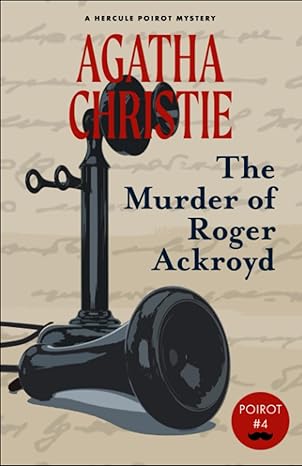| We’ve now posted a total of 17 book reviews. |
| Available now at the Amazon.com website … CLICK HERE! |
| Any and all books purchased through our website cost you nothing extra, but do help support our ongoing efforts. |
 Agatha Christie’s “The Murder of Roger Ackroyd” is a razor-clean demonstration of how a classic village mystery can feel both intimate and inexorable. Set in the seemingly placid lanes of King’s Abbot, the story begins with the shocking death of the title figure and quickly tightens into a closed circle of suspects—family, servants, neighbors—each hiding something small, human, and potentially important. Hercule Poirot, in self-imposed retirement nearby, is coaxed back to work, and from that moment the novel becomes a study in controlled pressure: routine questions that unsettle alibis, polite visits that dislodge telling fragments, and the steady conversion of rumor into evidence. Agatha Christie’s “The Murder of Roger Ackroyd” is a razor-clean demonstration of how a classic village mystery can feel both intimate and inexorable. Set in the seemingly placid lanes of King’s Abbot, the story begins with the shocking death of the title figure and quickly tightens into a closed circle of suspects—family, servants, neighbors—each hiding something small, human, and potentially important. Hercule Poirot, in self-imposed retirement nearby, is coaxed back to work, and from that moment the novel becomes a study in controlled pressure: routine questions that unsettle alibis, polite visits that dislodge telling fragments, and the steady conversion of rumor into evidence.
Christie’s engineering is immaculate. “The Murder of Roger Ackroyd” moves like a well-kept timetable—interviews, inventories, and reconstructed timelines all placed with surgical economy. The fair-play ethic is scrupulous: significant facts arrive plainly, tucked into everyday observation rather than wrapped in fanfare. Christie makes procedure pleasurable, showing how attention to small logistics—who was where, when, with what—can carry more charge than any laboratory trick. The pacing is brisk without haste, the chapters short enough to tempt “just one more,” and the transitions from drawing room to garden path to study feel effortless. Character work gives the book its warmth. “The Murder of Roger Ackroyd” surrounds Poirot with villagers rendered in quick, suggestive strokes—gossips with surprisingly sharp memories, relations with tidy motives, professionals whose composure is a little too practiced. Poirot himself is less theatrical than judicious: he listens hard, notices harder, and treats inference as an ethical craft. The narrative voice stays cool, observant, and lightly amused, capturing the small frictions and courtesies of a community where everyone knows enough to be dangerous but not enough to be certain. That tonal restraint keeps the stakes high without resorting to melodrama. Thematically, the novel probes what truth looks like in an ecosystem of half-facts. “The Murder of Roger Ackroyd” understands how easily a tidy story can be assembled from partial views, and how gossip can masquerade as consensus. Christie plays shrewdly with the distance between what is said, what is implied, and what is left politely unspoken. Questions of class, privacy, and reputation hover at the edges, giving the puzzle a social grain without slowing it down. The country-house frame feels familiar, but the moral shading is modern, alert to how people curate themselves under scrutiny. If there’s a caveat, it’s merely one of period: a few attitudes show their age, and some roles feel schematic by contemporary standards. The craft, however, is evergreen. “The Murder of Roger Ackroyd” earns its status not through spectacle but through proportion—facts arranged with clarity, motives weighed with care, and conclusions presented with a calm that invites reread. For newcomers to Christie, it’s an ideal entry point; for long-time admirers, it’s a reminder of how exacting the fair-play mystery can be when executed with poise. Close the covers and the lanes of King’s Abbot still rustle—as if the truth, once heard, continues to tidy the mind. |
